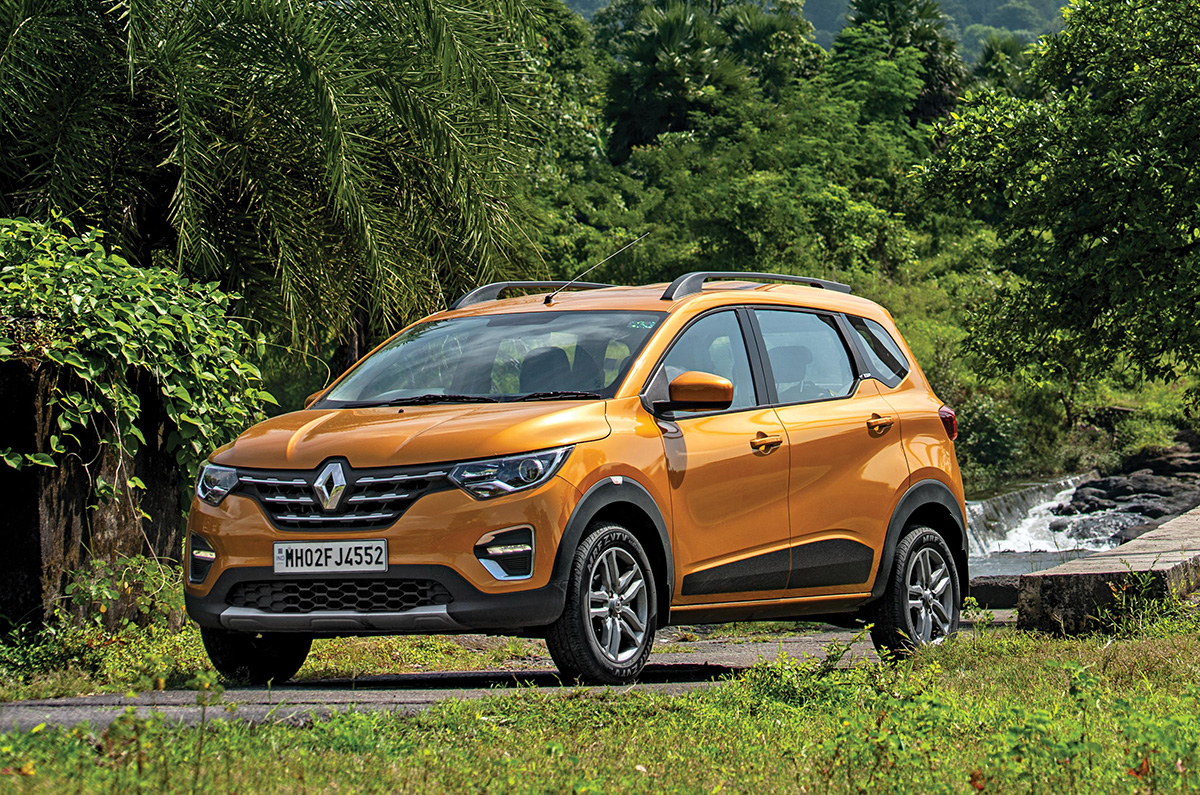
There are cars designed and developed for India and then there’s the Triber. Its seven-seat arrangement, compact sub-4-metre footprint, low-capacity engine and impressive price tag are just some attributes acknowledging that fact. We’ve had the Triber as a long termer for a while and it’s proven to be quite a competent family and home-moving machine. If you have been keeping track, you’ll notice something different about the Triber in these pictures. If you haven’t, let me tell you that it’s not blue anymore and that’s because this one is the new AMT-equipped ‘Easy-R’ variant.
While the car team rushes off to pick the nice sedans and SUVs, we, the motorcycle team, frequently use the MPVs, as they are the most practical support cars for our shoots. We ferry around cameramen, equipment, riding gear, luggage and more. And when the time came to plan our shoot of the BMW F 900 XR, it was the Triber AMT that was deputed. Honestly, I was a bit hesitant about whether it would be able to cope with what we were going to put it through. I thought its comparatively compact size and tiny engine would hinder our hectic, long-distance, single-day shoot.
In preparation, having read how easy it was to remove the third-row seats, that’s the first thing I found myself doing. While they can also be folded down, having them completely out of the way gave us much more room for equipment.
With the car loaded up and everyone on board, we set off for Dahanu, a coastal town around 150km north of Mumbai. Leaving before dawn meant that traffic was scarce, giving me the opportunity to gain a good understanding of the new AMT and re-tuned engine. The first thing you notice is that Renault has opted for smoothness over speed, when it comes to the shifts. The Triber flows through the gears, but the long delay between the shifts wasn’t something I was hoping for that morning.
Something else I came to notice is that driving with even a slightly heavy right foot will result in the engine sitting at the redline for an unusually long time. At around 100kph, the Tiber AMT finds itself nearing the limit in fourth gear instead of making the shift to fifth. You have to either let go of the accelerator and get back on it slowly to shift into fifth, or speed up to around 110kph. There’s also the option of switching over to manual mode and doing it yourself, and this switch also enables you to downshift into a more accessible part of the powerband; ideal for the swift tracking shot of the BMW F 900 we were after.
Once it’s in fifth, the three-cylinder engine quiets down, but it’s still audible. However, it’s something I quickly learnt to ignore thanks to the decent audio system. The large touchscreen with Android Auto is quite nice and it’s also positioned well, unlike other units that stick out and can obstruct the view. The only thing I really began to miss when it came to the interior was an armrest, especially on this AMT variant.
On the way back, even after more than 12 hours in the car, we didn’t have any complaints, and despite being an overly messy shoot, our muddy gear didn’t really stain the multiple white-coloured interiors. Also, the AC vents in the second and third rows and the cooled glovebox are features you really begin appreciating after a long day. Speaking of appreciating things, this is also when my left leg became thankful for the AMT. The traffic just kept getting denser, but my inputs stayed the same. The light steering and the crawl function were relieving, to say the least. I have become quite used to this and am not looking forward to tackling Mumbai traffic after I’ve given the car back.
from Autocar India - Cars https://ift.tt/3p86IF3

0 comments:
Post a Comment